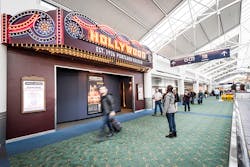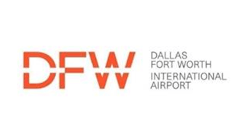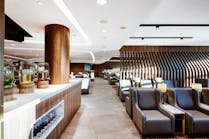Travel can often seem like more of a hassle than it’s worth. The luggage is packed and loaded in the car bright and early to catch the morning flight out. The only item not packed is the coat you’re wearing, and while it’s need it now, it’ll be 70 and sunny all week at your destination. A catch-22: leave the coat and suffer a cold drive to and from the airport, or lug the puffy accessory with you the rest of the trip?
Enter Milwaukee Mitchell International Airport (MKE), who introduced a first-of-its-kind coat check service in January, alleviating the coat conundrum of their local Wisconsin passengers escaping northern winter for southern warmth.
“One of the most frequently asked questions at our airport information traveler's aid desk is do you have lockers? Is there somewhere where I can put my coat? That's been the situation for a number of years because lockers are not permitted in airports,” said Harold Mester, MKE’s director of public affairs and marketing. “Coats take up a lot of space in luggage and if you're able to free up that space, maybe you take your smaller suitcase instead of your larger one and you just do a carry on. It could be the difference between a passenger checking a bag or taking a carry on.”
Mester said that the coat check idea was something that MKE leadership had had in the back of their mind for some time. When the airport issued an RFP for a new concession program, they included the coat check.
“We thought that would be an appropriate place to put this idea and see if it's something that would be workable,” added Mester.
Paradies Lagardère was able to make the coat check a reality and incorporated the service into the Summerfest Marketplace, a merchandise store offering unique goods inspired by the annual Summerfest music festival in Milwaukee, which opened in January. The shop is located between MKE’s two main concourses, a convenient location for people ready to lose their jacket. Passengers just need to show their driver’s license and provide their flight information to use the service.
“You go to the Summerfest Marketplace Store, go to the main cashier station and present your coat and they log it and give you a claim ticket, then the coat is bagged in a plastic garment bag and it's stored in a secure storage area in the back of the store. Then when you returned from your trip, you present your claim ticket and the clerk will give your coat back to you,” Mester described. “It's a great service to take advantage of during the wintertime and spring break period.”
The employees of the Summerfest Shop keep track of the return flights of customers with checked coats and stay open for those whose flights arrive past the store’s normal operating hours. Coats are stored for $2 a day, with a cap at $10, but coats that are checked for over 30 days become an unclaimed item. The shop is open and ready in time to meet the needs of passengers on the first flight of the day.
Restrictions to the service include only accepting winterwear items, such as scarves and mittens, no backpacks or other such items. Coat pockets must be empty.
Being a first of its kind service, Mester said that the airport and Paradies Lagardère were charting new territory and it took a few weeks to find their footing.
“Paradies Lagardère had never operated a coat check before, so they had to develop the actual procedure for it,” said Mester. “We weren't sure exactly what to expect and we couldn't really look at the experience at other airports because they didn't have one. So, we're kind of the trailblazers on this one, but we knew that there would be some demand for it if we got the word out.”
And demand there was that. MKE had 200 coats checked within the first week of service before they even began advertising the service in the airport – with people spreading the word just from MKE’s social media posts about the coat check. They had to find additional storage space to meet demand.
“It's been interesting because we generated a lot of buzz both locally and nationally and within the industry, everyone was saying, ‘well, why didn't we think of this sooner? And this should have been thought of before.’ No airports our size or larger had implemented this before,” Mester said.
MKE plans to operate the coat check annually from Dec. 1 to April 1 but may keep the service running longer into the spring if there continues to be demand.
Layover, Say Game Over
You’ve just touched down with a five-hour layover in front of you before the connection out. What’s there to do? How about defending the post-apocalyptic wasteland from mutant hordes? A real possibly for visitors of Gameway, the 4K premium video game lounges at Dallas/Fort Worth International Airport (DFW).
“Gameway's motto is to make airports entertaining and we think the best vehicle for that is through video games,” said Jordan Walbridge, who co-founded Gameway with his wife Emma.
Walbridge, an entrepreneur and US Army veteran, said the idea for Gameway came from seeing gaming lounges outside of the airport setting. These locations, however, tended to cater to younger audiences and were not consistently busy, with peak times being on the weekends – not a recipe for long term success. Emma, who has experience running hotels, said the trick of the business model was how well you did on weekdays.
“When she said that, I was like, ’ah, you're right, let's just move on." She goes, ‘except, unless, you're in a place that's busy all the time.’ And so where does that exist? She goes, "I don't know, like the airports,’” Walbridge recounted.
Walbridge said it was a lighting in the bottle moment for the two.
“I became obsessed with the idea and together we decided to figure out, what would a premium video game lounge look like at airports that caters to the everyday traveler, the young professional, and also a place where, whether it's a kid or a grandpa, would want to come in and play,” said Walbridge.
Walbridge pitched the idea to a number of airports, but it was DFW that saw the potential. Gameway has two locations at DFW, one at Terminal B and at E. They have a licensing deal with Sony’s Playstation and bring the latest in gaming releases to the lounge. Passengers can purchase blocks of time in 30 minutes, one and two hours, or for an unlimited all day pass.
“You get your own station, which comes with your own 4K TV, your own HyperX headphones, a charging station and a luggage compartment. Every station has its own personal PlayStation 4 Pro with over 30 games pre-downloaded, and each station has its own dedicated high-speed internet. So, whether you're playing online multiplayer or campaign mode, you'll never have any kind of lagging whatsoever.”
Gameway has been open for two years and the success of the business has been great enough to allow the Walbridges to sign a seven-year lease on a third location at DFW at Terminal D.
“Consumers are responding to it. They're loving it and it is welcoming to everybody. And it is different, so it doesn't compete with a lot of other things in airports which would be restaurants, bars or traditional retail elements. We don't compete in that space. So, airports are seeing it and like, ‘yeah, this is something we need to do and we need to find space for,’” said Walbridge.
The success, Walbridge said, is helped by DFW’s willingness to explore the new market and embrace the necessity of providing a positive customer experience.
“With travelers sometimes stuck in airports for between two to eight hours at a time, what is it that you can do in there to really enjoy yourself? And so, you see this dynamic change, this big push towards customer experience in the last several years. Gameway has just happened to be on that forefront of what truly a great customer experience could look like.
“Considering 64 percent of Americans are playing video games daily, and the average person who plays video games is somewhere in their mid-thirties, we thought this was a perfect concept because what you're trying to do at airports, oftentimes you're stressed, you're having anxiety, and when you look at gaming in general, 70 percent are saying that they play because it does relieve stress and anxiety.” Said Walbridge.
Don’t Get Up, Get Charged
Space-age technology at the airport isn’t something new, but resting your feet on it might be. That’s just the goal of the BodyCharger System, the latest offering from Good Vibrations, LLC and founder and inventor Mark Eberhardt, which uses whole body vibration to stimulate and keep the body active while seated at the gate.
“Whole body vibration is basically a mechanical way of stimulating muscles,” said Eberhardt. “It was actually invented by Russian space scientists, and NASA used it to help astronauts exercise while they are in space.”
Eberhardt, who invented the vending massage chair and previously worked in banking, said he first became aware whole body vibration when researching the health consequences of prolonged immobility.
“I started to look into it and found out that the number one contributor of poor health and serious illness in the United States today is prolonged sitting and lack of exercise. That is because it slows the most important factor in good health which is good circulation,” said Eberhardt. “Obviously when we travel, prolonged sitting is unavoidable.”
He found that doctors recommend any activity and low-intensity exercise before and after flying to get the blood going. However, the average person likely won’t be doing calisthenics in the terminal. So Eberhart found a way to bring exercise to the person through the BodyCharger System.
“The BodyCharger systems allows most every person in an airport to stimulate their circulation effectively, quickly, and conveniently through mechanical muscle stimulation generated by whole body vibration. When travelers place their feet, they can leave their shoes on, on the BodyCharger vibration plate, their lower extremity muscles will fire or exercise. The muscle movement is induced by mechanical stimulation. It is exercise. Your feet even sweat and you can actually see the muscles move. You even feel it after a couple hours, just like when you jog,” Eberhardt described.
The BodyCharger System is easily installed in front of the seating airports already have. There’s no charge to sit at a seat with the system installed, but to engage the vibrations and USB chargers, users can insert cash or swipe their credit card. Two minutes of vibration costs $1 and 10 minutes costs $5.
“We fabricate a platform in which the vibration unit sits on top of and is bolted to that platform on the inside, and it also allows us to hide the electrical cords. And then we just simply slide it right in place,” Eberhardt said. “The revenue for airports can be extremely compelling and it's a simple way for them to get immediate income. There's no build-out. They're a plug-and-play amenity.”
The BodyCharger System is currently installed at the Greenville-Spartanburg International Airport and Eberhardt said the response from travelers has been “oh my god.”
“People absolutely love them. If I happen to be there servicing, I've had hundreds of people tell me, ‘this is absolutely fantastic. I wish you had this in my airport.’ One guy was having trouble walking and you could tell he was tired from walking to the gate. And I asked him if he wanted to try it, ‘sure.’ So we sat down and put his feet on the vibration plate and I put in a free coupon for him. He just like melted. He looked at me with his mouth open, he says, ‘oh my gosh, this is fantastic.’ We get the ‘oh my god’ all the time,” Eberhardt described.
Eberhardt is continuing to improve the systems’ design, recently adding a table to them, and educate people one the benefits of whole body vibration. He sees a future where the BodyCharger System is a staple in airports around the world.
“There's no reason why this should not be in every airport in the world. It should be a staple in an airport like water fountains and heart defibrillators,” Eberhardt said.
Catch a Flight and a Film
The Hollywood Theatre is a 1926 movie palace located in Portland, Oregon. In 2017, the theatre gained a counterpart at the Portland International Airport (PDX).
The Hollywood Theatre at PDX is a first-of-its-kind, 17-seat free microcinema located post-security at PDX’s concourse C. The theatre showcases short films from Oregon natives, played on a 24/7 loop and is open to all airport passengers.
The theatre took three years from concept to opening, but Doug Whyte, executive director of the Hollywood Theatre, said PDX was interested in the idea from the get-go.
“We had read an article about some movie theaters in airports overseas. Portland airport is a pretty creative, real locally focused airport, and it just kind of felt like they might be open to something like this,” Whyte recounted. “Their initial reaction was they were very interested.”
The challenge was figuring out what the theatre would exactly look like and how it would operate.
“There's not a lot of big international layovers and things like that. So right away it was kind of like, well, what would this be? Because feature length films wouldn't really work that well. People don't have two, two and a half hours to watch a film. So, right away we thought of something where people could pop in and out that was free, that had short films by local artists,” Whyte said.
Films rotate out quarterly at the theatre. The films show amount to about an hour’s length all together and are reviewed by the airport to ensure they’re appropriate for all ages.
As a none profit organization, the theatre relies heavily on donations, but that hasn’t stopped it from being able to offer the same full-size move going experience at the airport.
“Pretty much all the projection and sound equipment was donated to us from a company called Triad Speakers and Barco Projectors, and a whole group of theater people came together to donate everything. We have about a $200,000 projection and sound system that was donated, and they actually help us upkeep it and keep things running smoothly. If something breaks, they replace it. Those partners who are donating all their time and resources, really make it happen,” said Whyte.
And the response to the Hollywood Theatre at PDX has rivaled that of its full-sized counterpart.
“It's been kind of amazing actually. We have this big beautiful historic theater on Sandy Boulevard here, but it's funny, I probably get as many comments about our airport theater as the big historic theater. To me it just seems like it's universally loved and such a unique thing, and people see it as a very Portland thing. There is a lot of excitement around it,” Whyte described.







